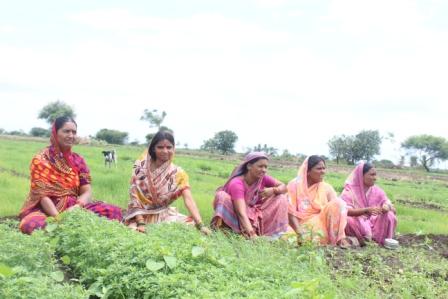Where Women Farmers Make History
Women farmers working had

MASALA KHURD VILLAGE: Shailaja Narvade, a woman in early forties, while instructing a group of eight women to harvest fenugreek and tie them bundles, shares her plans to cultivate papayas on ten guntas of land and also to dig a new well to supply water to it. It requires her 3-4 four lakhs rupees but she was game for it. Here at a patch of her two acres of land, coriander, shepu and onions are being harvested daily to send markets at Pune and Aurangabad.
Till two year ago, Shailaja, a barely eighth pass lady, would hardly cross entrance of her house at Masala Khurd village in Osmanabad district. Neither she was used to conversations with neighbors next door. Today she along with other 84 women of the village cultivate organic food at their farms and earn 50 thousand a year. Shailaja has admitted her daughter who dreams to be an IAS at one of the colleges in Pune while she guides her son who is not interested in studies, at farm.
“Earlier we were labourers who toil at family lands free of cost. We had no say on what to be cultivated, where vegetables and grains to be sold. We had to request our husbands for money when in need,” explains Chitra Gaud, another village woman.
Stories of innovative farming experiments aired on radio or shown on television or articles in media and discussions among farmers and families, made women in the village realize that they were mere labourers who toil and earn nothing. Consistent discussions, projects by NGOs and government’s Krishi Vidnyan Kendra motivated them to conceive a plan that will earn them at least some money.
Two years ago, Shailaja, Chitra and couple of other women founded a group called Mahila Krushi Mandal (Women farmers group) and convinced 80 women to join in.
“The idea was to ask for an acre of land from respective families and decide what to be cultivated at that piece of land, toil over there and also to claim over yield and money earned with it. If family of a woman does not own land, she leases it out,” Shailaja narrated path breaking initiative the group had embarked on.
“Basic goal was to harvest grains and vegetables that are required to feed families. And if there were remains, they would be sold in market, and returns would be kept in by women and not men of the houses,” Shailaja added up.
“We have seen how chemical fertilizers and pesticides and crash crops have worsened health of soil. We were also aware of side effects of crops grown up with chemicals on health of people. Hence all opted for organic farming,” Minakhsi Thomabre said.
They also learned techniques of vermi compost to produce fertilizers with farm and animal wastes. They manufacture pesticides with leaves of trees like Neem and animal waste. “Usage of homemade fertilizers and pesticides save us 20-30 thousand rupees a year,” informed Thomabre. A few women have begun to sell these organic fertilizers and pesticides to farmers in nearby villages and earn extra.
Besides, the group decided to use seeds that are home grown instead of those sold in shops. “We plant 100 seeds at home to check fertility of seeds. If more than 60-70 saplings grow then seeds are good to be cultivated. This saves us additional 15-20K of seeds,” says Narwade.
Whenever they confront problems they seek help from Krishi Vidnyan Kendra or volunteers of NGOs like Swayam Shikshan Prayog.
Multi cropping is preferred. Jowar and wheat are cultivated as major crops while vegetables are planted in between major crops. “Since we have preferred multi cropping, production value of soil has increased tremendously. Otherwise earlier production of cane year after year had bad effect on soil,” informed Parvati Zadbuke, another farmer.
Women understand value of cooperation and hence instead of hiring labours, toil at each other’s farms in rotations in groups of 8-10. “Women in our village are hard working. They begin physical work at 5 am and finish their first shift by 11. By 12 they are again at farms busy in tasks. Our team work save 6-10 thousand of labour cost,” Chitra Gaud pointed out.
Women own cattles like buffalos, cows, sheep, chickens, and other animals. “We run small dairies, sell milk, ghee and milk products. Animal wastes provide fertilizers. This is one more source of income,” Radhika Kambale said.
Harvest excesses need of families and is sold at market. “Vegetables are sold in the markets at Pune, Mumbai and Hyderabad. We earn handsome amount of around 30-40 thousands per season excluding investment. Besides usage of homemade seeds, fertilizers and pesticides saves 40-50 thousands that is also earning,” Anita Khanapure pointed out.
The experiment that proved economically beneficial for families and in turn for village has empowered women. “Nobody among 85 women has studied more than 12th. But today we take decisions at house and farms, confidently face problems,” Shailaja Narvade listed out achievements of women.
The innovative efforts are acknowledged by Akashvani with Laksmi Kisan Purskar. A number of NGOs and groups of farmers from Mumbai and Tamilnadu have visited the unique project.
But for women the real achievement is their and families improved health due to consumption of organic food. “We have been witnessing that we are no longer have to go to doctors like we had to earlier,” said Narwade.



